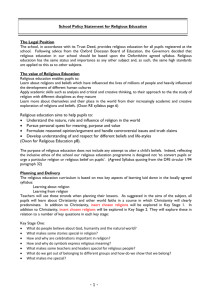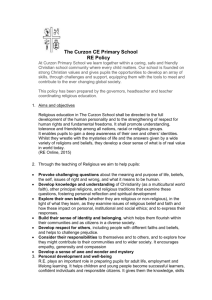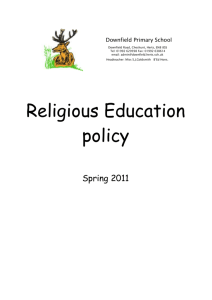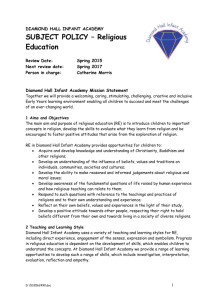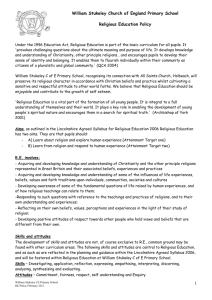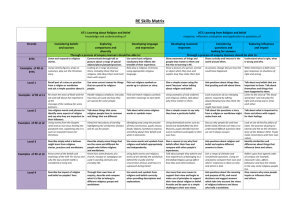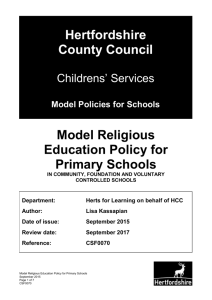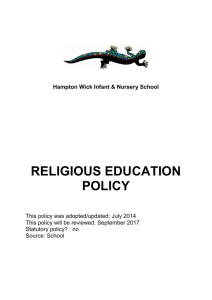being special, special people, times and places
advertisement
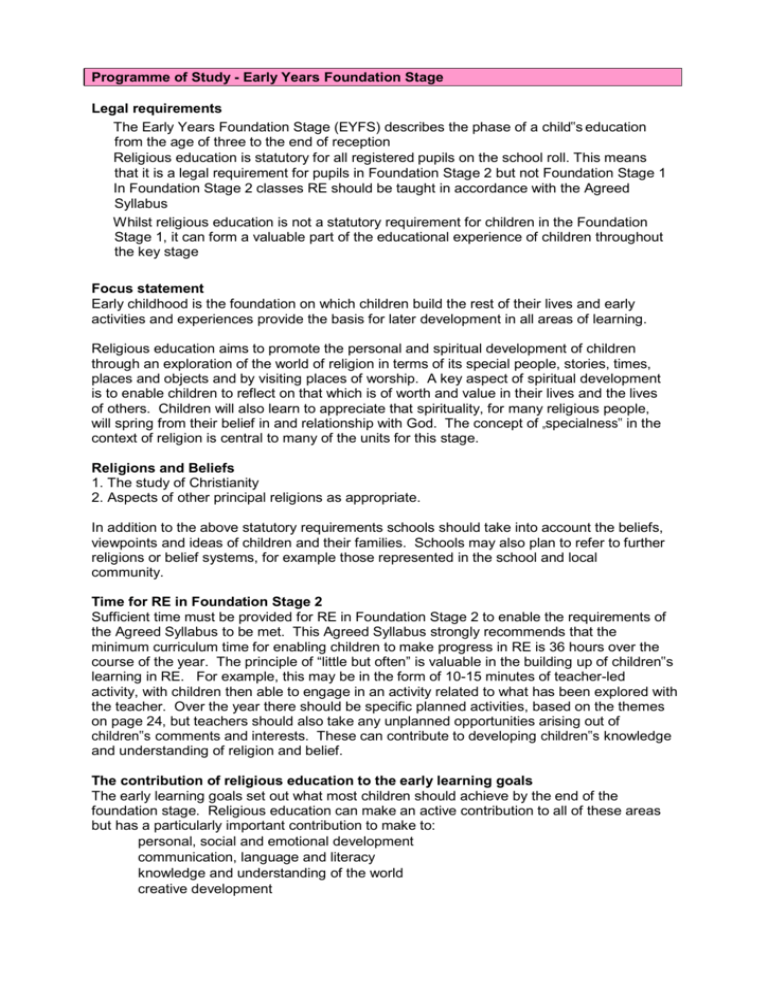
Programme of Study - Early Years Foundation Stage Legal requirements The Early Years Foundation Stage (EYFS) describes the phase of a child‟s education from the age of three to the end of reception Religious education is statutory for all registered pupils on the school roll. This means that it is a legal requirement for pupils in Foundation Stage 2 but not Foundation Stage 1 In Foundation Stage 2 classes RE should be taught in accordance with the Agreed Syllabus Whilst religious education is not a statutory requirement for children in the Foundation Stage 1, it can form a valuable part of the educational experience of children throughout the key stage Focus statement Early childhood is the foundation on which children build the rest of their lives and early activities and experiences provide the basis for later development in all areas of learning. Religious education aims to promote the personal and spiritual development of children through an exploration of the world of religion in terms of its special people, stories, times, places and objects and by visiting places of worship. A key aspect of spiritual development is to enable children to reflect on that which is of worth and value in their lives and the lives of others. Children will also learn to appreciate that spirituality, for many religious people, will spring from their belief in and relationship with God. The concept of „specialness‟ in the context of religion is central to many of the units for this stage. Religions and Beliefs 1. The study of Christianity 2. Aspects of other principal religions as appropriate. In addition to the above statutory requirements schools should take into account the beliefs, viewpoints and ideas of children and their families. Schools may also plan to refer to further religions or belief systems, for example those represented in the school and local community. Time for RE in Foundation Stage 2 Sufficient time must be provided for RE in Foundation Stage 2 to enable the requirements of the Agreed Syllabus to be met. This Agreed Syllabus strongly recommends that the minimum curriculum time for enabling children to make progress in RE is 36 hours over the course of the year. The principle of “little but often” is valuable in the building up of children‟s learning in RE. For example, this may be in the form of 10-15 minutes of teacher-led activity, with children then able to engage in an activity related to what has been explored with the teacher. Over the year there should be specific planned activities, based on the themes on page 24, but teachers should also take any unplanned opportunities arising out of children‟s comments and interests. These can contribute to developing children‟s knowledge and understanding of religion and belief. The contribution of religious education to the early learning goals The early learning goals set out what most children should achieve by the end of the foundation stage. Religious education can make an active contribution to all of these areas but has a particularly important contribution to make to: personal, social and emotional development communication, language and literacy knowledge and understanding of the world creative development Whilst religious education makes a strong contribution to the achievement of these goals it is important that planning for RE starts from and meets the requirements of this Agreed Syllabus. In the foundation stage, children‟s attainment in RE is assessed in relation to the stepping stones and the early learning goals. Learning experiences and opportunities in the Early Years Children should be provided with opportunities in RE to: listen to and talk about appropriate stories which engage children directly experience religion – engage with artefacts, visit places of worship (with a focus on feelings and symbols), listen and respond to visitors from faith communities get to know and use religious words accurately e.g. God, Bible, synagogue, church, prayer use all five senses – smell (e.g. incense); taste (e.g. special foods) see and touch (e.g. religious artefacts); hear (e.g. chants/hymns/prayers/bells) make and do – make festive food, role play, dress up, dance have times of quiet and stillness share their own beliefs, ideas and values talk about their feelings and experiences use their imagination and curiosity to develop their appreciation and wonder of the world in which they live begin to use ICT to explore religious beliefs and beliefs as practised in the local and wider community. Early Years Foundation Stage themes and outcomes for Religious Education During the foundation stage, children begin to explore the world of religion in terms of special people, stories, times, places and objects and by visiting places of worship. The units are designed to be taught thematically, drawing on material from Christianity and at least one other religion. In planning how these are to be taught, practitioners should remember to keep a balance between hearing and exploring religious stories and practices and helping children reflect on their own feelings and ideas arising from these. Whilst the unit on Special Times can be taught discretely, it is more likely to be encountered on a seasonal basis. If these occasions are taught annually, it is important to co-ordinate planning with KS1 to ensure continuity and progression. The following grid aims to help early years practitioners identify the specific RE learning needed to provide a good foundation for later learning. Themes Learning outcomes Suggested content Early Learning Goals Teachers will set up learning experiences that enable children to be able to: Teachers can select content from this column to help pupils achieve some of the learning outcomes in column 2. Teachers can use different content as appropriate. Practitioners should select the relevant Stepping Stones/ELGs from within the following aspects of the Areas of Learning as appropriate: Being special share and record occasions when things have happened in their lives that made them feel special recall simply what happens at a traditional Christian infant baptism and dedication the idea that each person is unique and valuable how this is shown in Christianity through infant baptism and dedication signs and symbols used in the welcome of children into the faith community Special People talk about people who are special to them and say what makes their family and friends special to them identify some of the qualities of a good friend reflect on the question „Am I a good friend?‟ recall and talk about stories of Jesus as a friend to others recall stories about special people in other religions and talk about what we can learn from them people who are special to us, who we admire the benefits and responsibilities of friendship and the ways that people care for others stories from the Bible about friendship and care for others stories of a key religious leader from another religion and how these are important to people today give examples of special occasions and suggest features of a good celebration recall simply stories connected with Christmas/ Easter and a festival from another faith say why Christmas/Easter and a festival from another faith is a special time for Christians/ members of the other faith the importance and value of celebration in children‟s own lives some major religious festivals and celebrations e.g. seasonal festivals including Christmas and Easter, and the stories associated with them talk about somewhere that is special to themselves saying why be aware that some religious people have places which have special meaning for them get to know and use appropriate words to talk about their thoughts and feelings when visiting a church express a personal response to the natural world why some places are special and what makes them special the church building as a special place for Christians religious beliefs about the world as a special place Special Times Special places PSED Dispositions and Attitudes Self-Confidence/SelfEsteem Sense of Community Making Relationships Behaviour and SelfControl CLL Communication (B, C&D) Thinking Reading Writing KUW Sense of Time Sense of Place Exploration and Investigation (A&B) Cultures and Beliefs CD Imagination Exploring Media and Materials Responding to Experiences Expressing and Communicating Ideas

